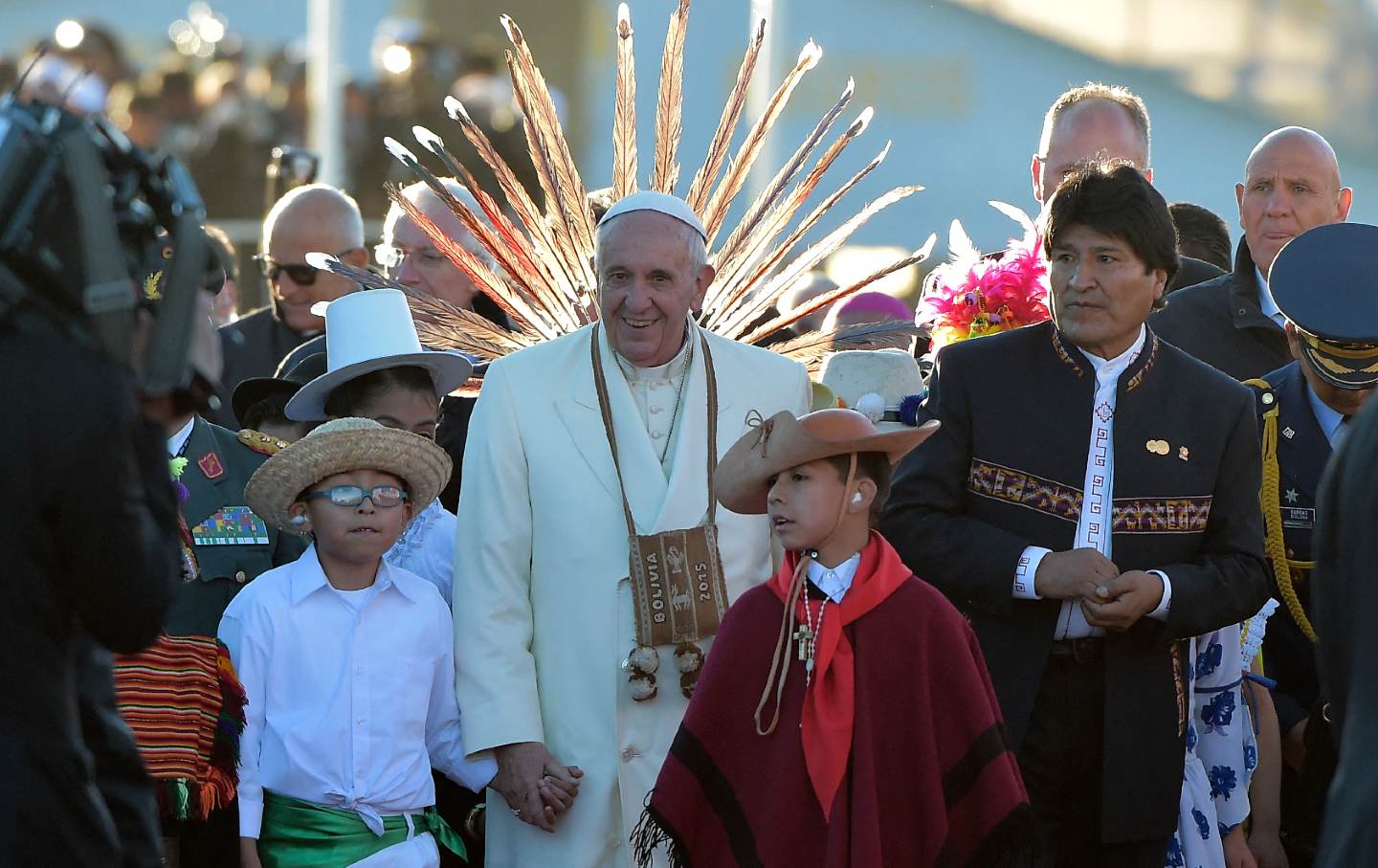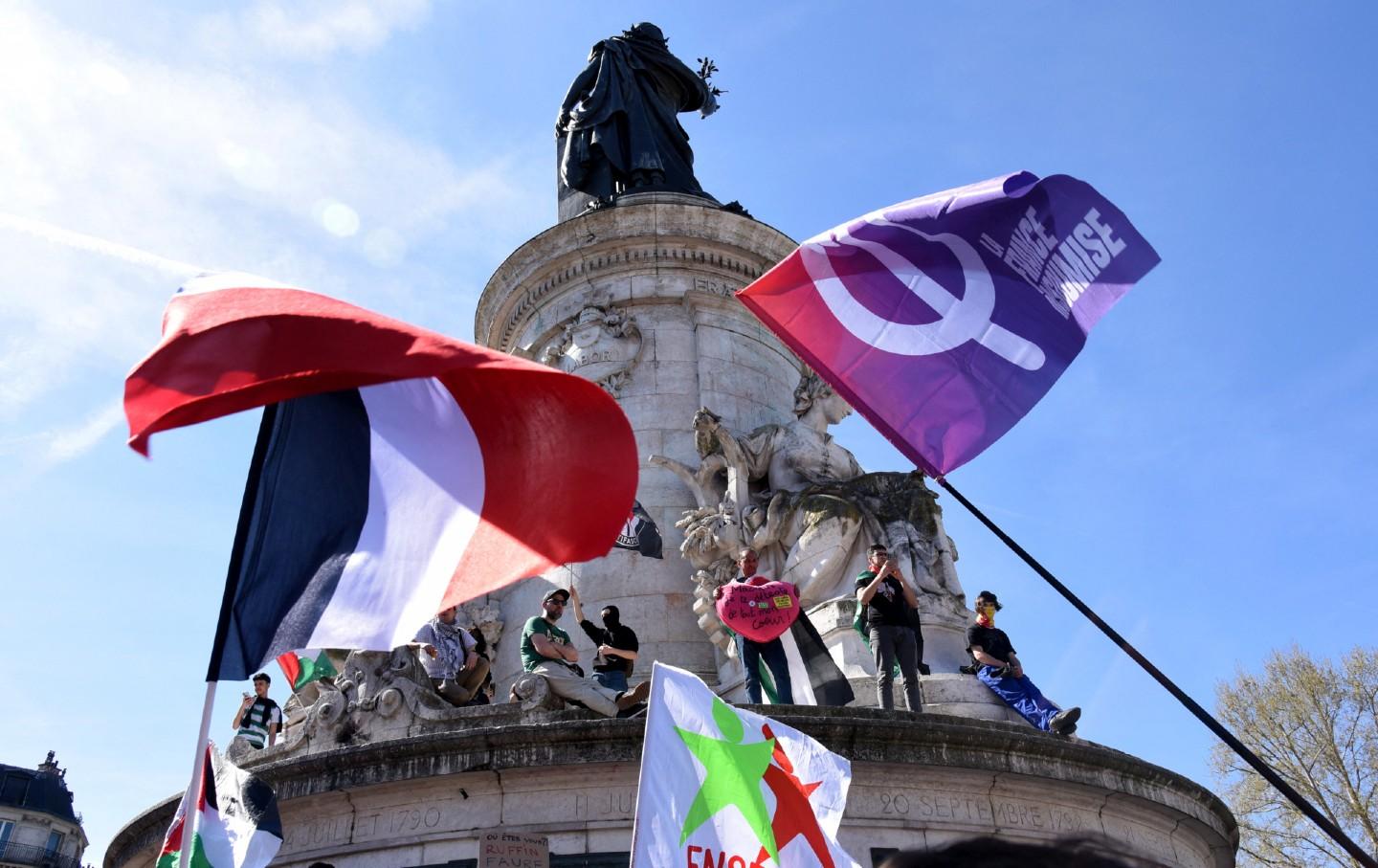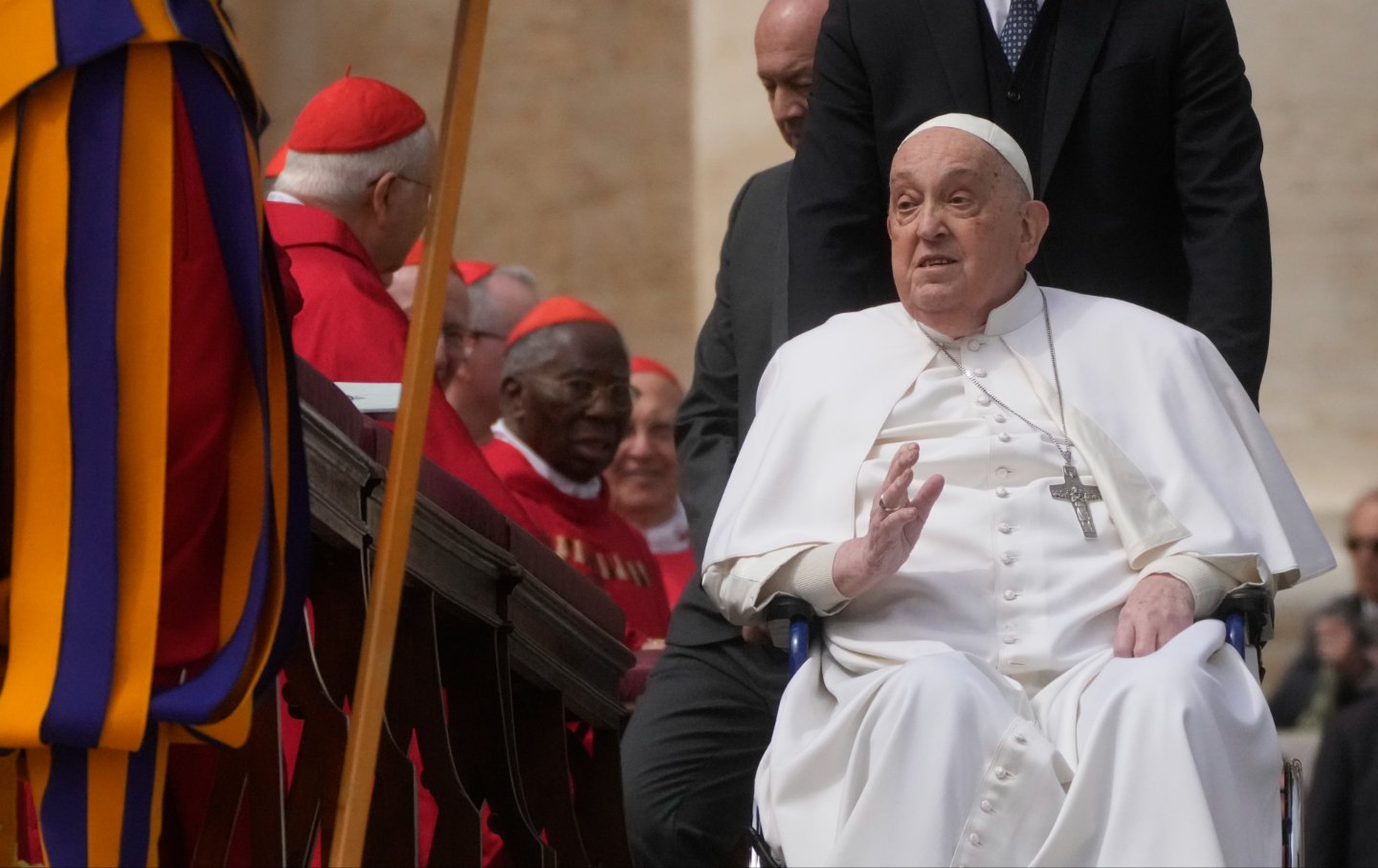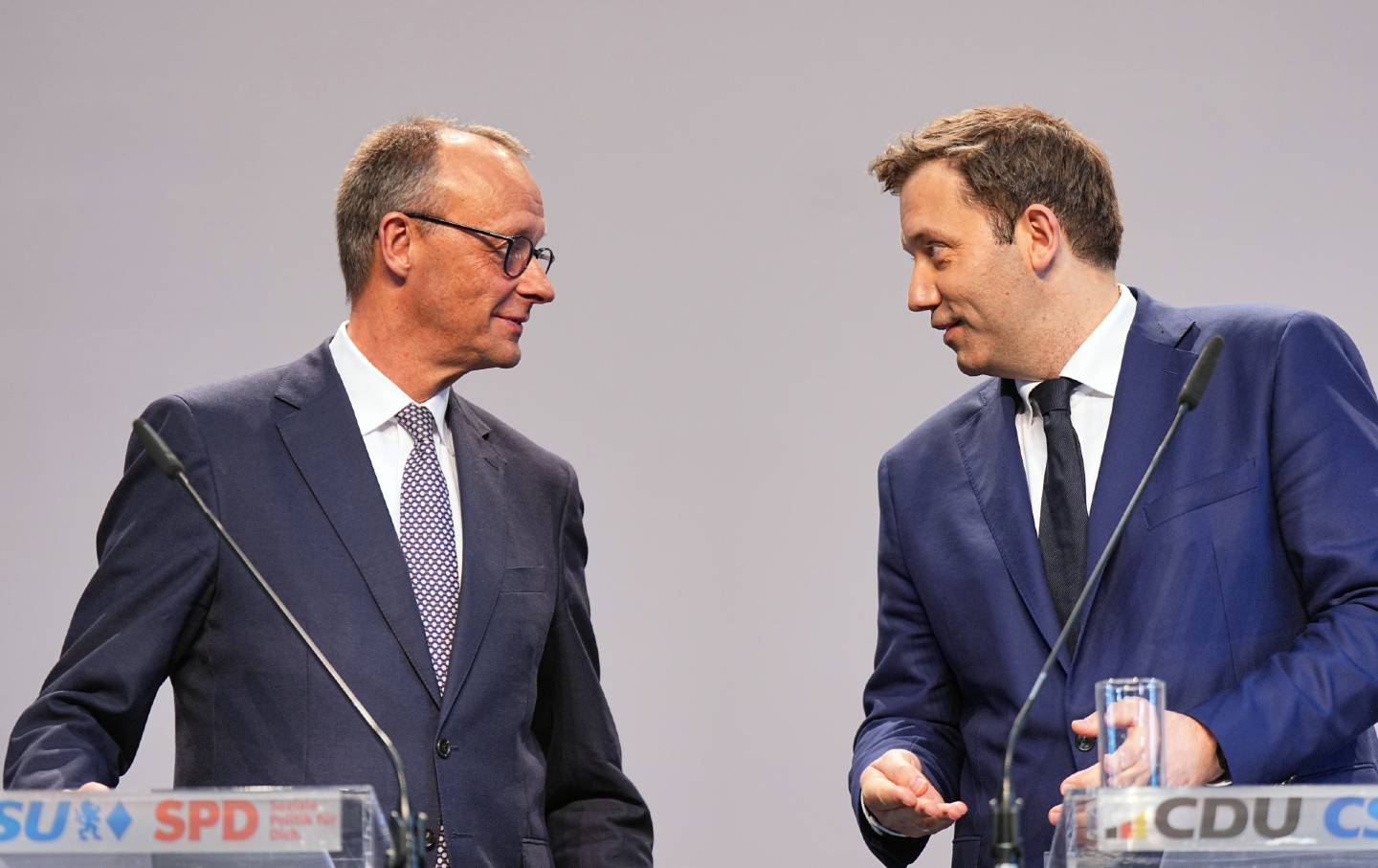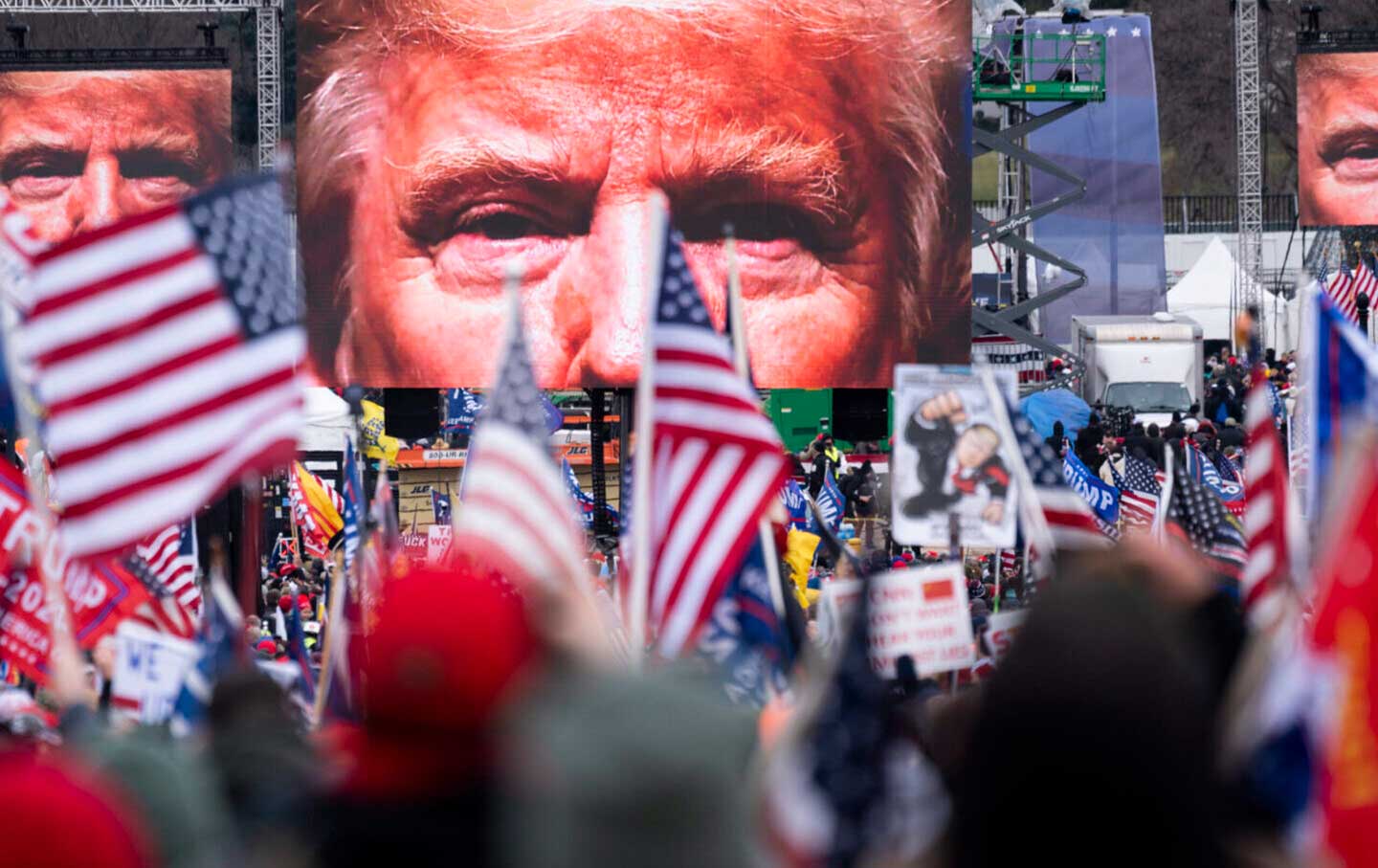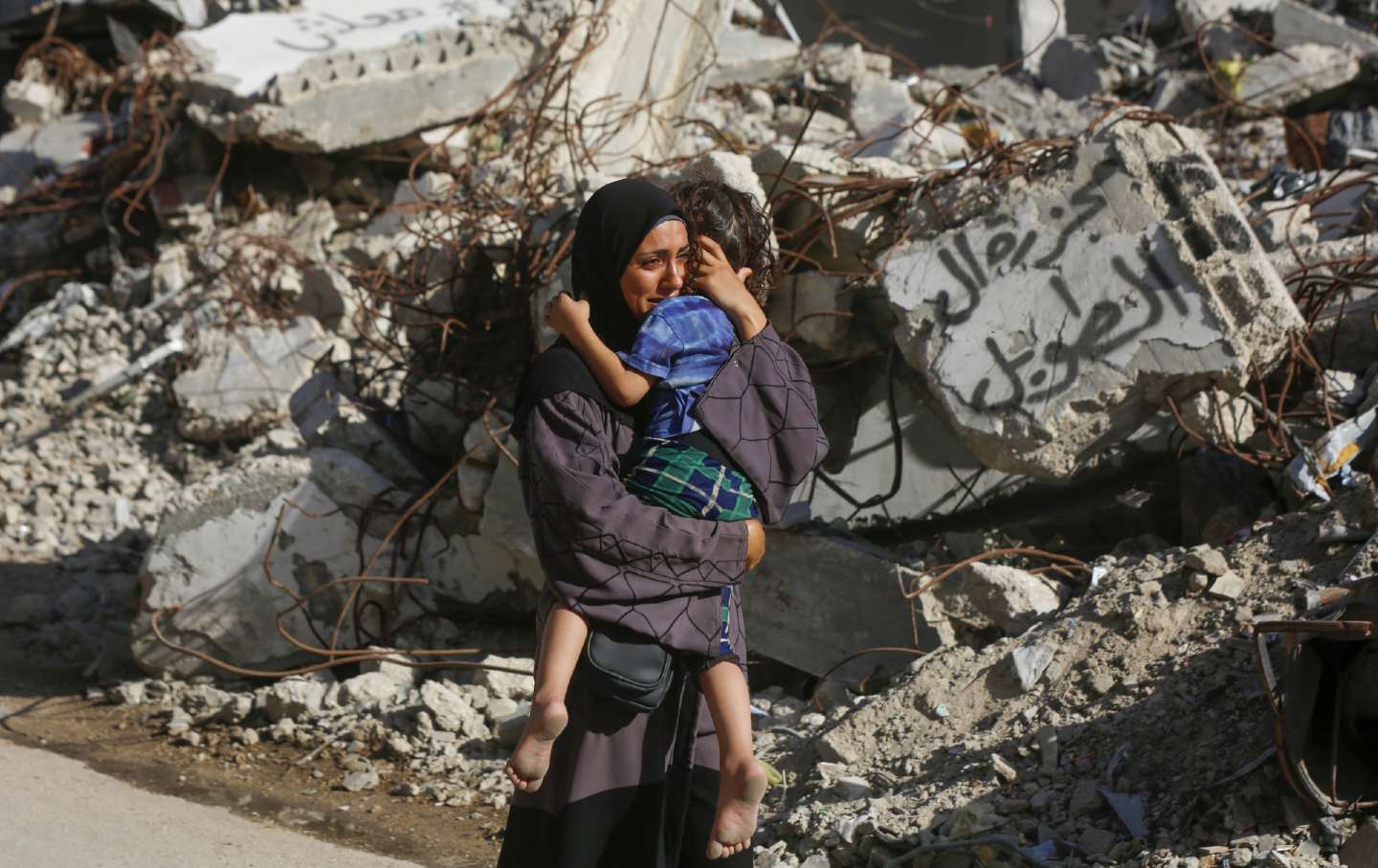Can We Build a Shared Homeland for Israelis And Palestinians?
In this conversation, Jon Wiener and May Pundak of A Land For All discuss a road map for a better two-state solution.
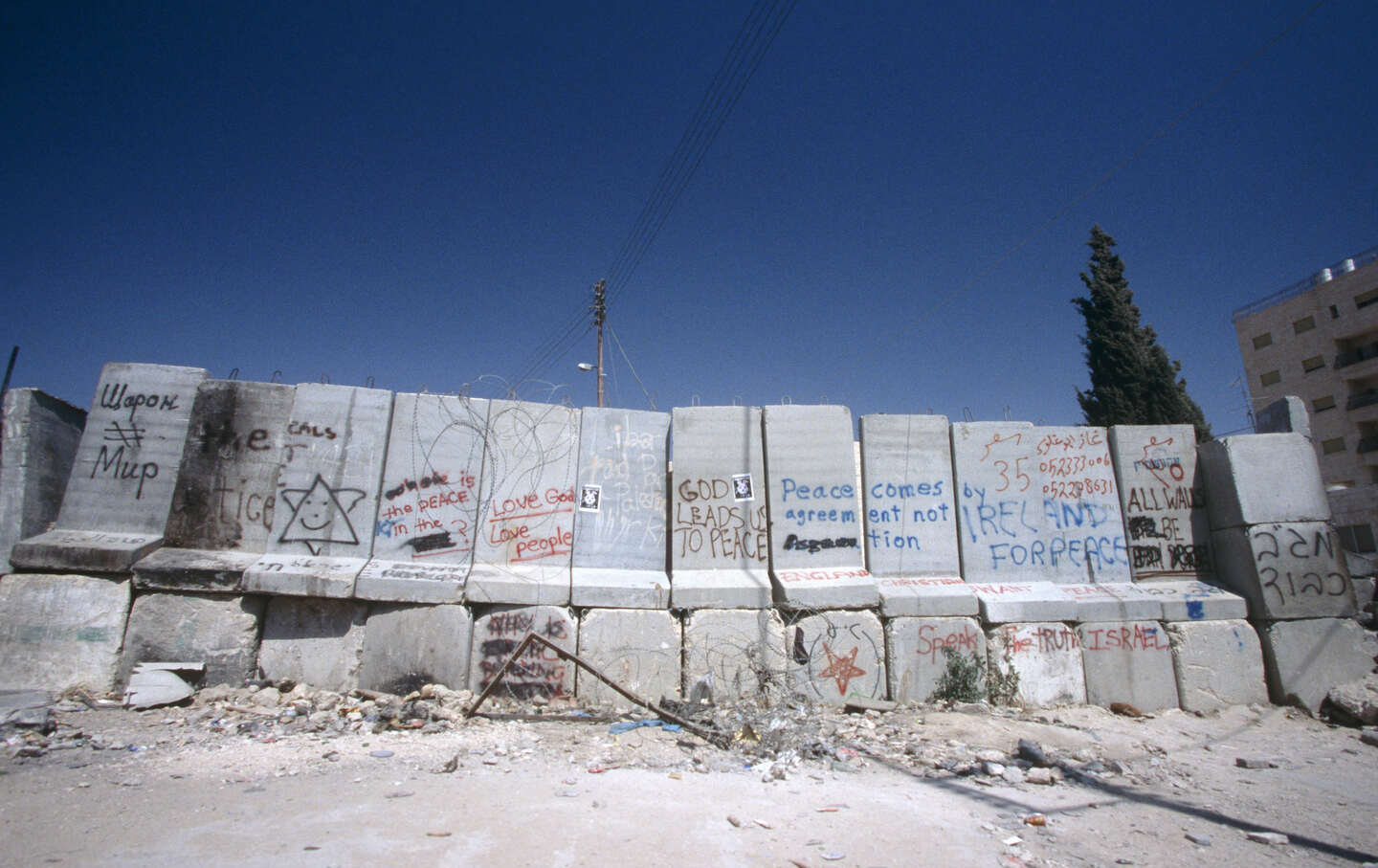
Wall separating Israel and the West Bank.
(Getty Images)A Land for All is an organization of Palestinians and Israeli Jews working on a long-term political solution. UCLA professor David Myers calls it “a group that engages in precisely the kind of political imagination we need right now.” May Pundak is an Israeli Jew, a feminist and lawyer, and a longtime anti-occupation activist who is a co–executive director of the group.
This interview has been edited and condensed. The full audio and transcript can be found at the Start Making Sense podcast.
Jon Wiener: We want to look beyond the daily news of Israel’s destruction of Gaza and talk about a political solution that will bring real equality and justice to Palestinians as well as Israelis. It’s been clear from the beginning of this war that Netanyahu had no goal beyond what he called “complete victory over Hamas.” But what should happen after the war? The US policy for decades has been to support a two-state solution. But today that seems problematic or obsolete.
May Pundak: The reality is so, so, so bleak today. The war on Gaza, and on the Palestinian people well beyond Gaza, in the West Bank, and in East Jerusalem, and within Israel itself, is continuous and continuing. And children are starving today in Gaza. In a way, it is fair to say that we are all complicit in this. I think it’s important to start there, and not make this a conversation that is on another, higher level that is disconnected from where we are. But I honestly believe that a political vision and a political horizon can be a mechanism to end this war faster.
JW: What are the biggest problems now with the idea of two states?
MP: I still think that there should be two states for two people. Palestinians have never had the right to self-determination. People today focus on the idea of complete partition and separation and even segregation between these two states. But at this point, it is impossible, and also undesirable, to adopt the principle of segregation. What we are offering is to move beyond that paradigm, towards two states with very tight cooperation and collaboration. The interdependency between Israelis and Palestinians and between Israel and the future Palestinian state is so deep that trying to untangle it in order to reach complete partition—that is the biggest mistake.
JW: The idea of a homeland is central to your proposal.
MP: Both Israelis and Palestinians have a very strong attachment to this homeland. There’s nothing we can do about that. Palestinians will forever see Jaffa and Haifa and Akko and Lod as part of Palestine. Palestine is Palestine. And for Israel or Eretz Yisrael, and I think needless to say, even with this awful government that needs to go, Hebron will always be part of Eretz Yisrael. This is just the reality.
And the next level is emotional. The emotions leading this conflict are tremendous. If we don’t give a good answer to these emotions, if we think that we can leap over them just by cutting up and dividing this land with a blue line or a green line, it’s not going to work. You have to address the sentiment of the people, otherwise it will control us forever.
JW: How do you propose to change these realities?
MP: A shared homeland is a way to break the binary in the zero-sum game. Normally, when you think about this idea, we say, “OK, Israel here, Palestine there. We divide it, we build a big wall.” But what if we challenge that assumption? What if the homeland is shared, but within that homeland, which is already shared sentimentally, which is already shared in many ways physically and practically and materially, what if there are two nations, two separate, independent, sovereign states within this one land? We propose one land with citizens of two separate states, with the goal of freedom of residency and freedom of movement for all.
JW: Two independent states that share one homeland. Is there anything like what you are proposing, anywhere in the world?
MP: Yes and no. Israelis and Palestinians, and much of the rest of the world, are convinced that the Israeli-Palestinian conflict can never be solved. But harder and more complicated conflicts have been solved. That’s the starting point. Look at the European Union and think about the history of France and Germany in the past 300 years—that is a good example that pushes our political imagination.
JW: Germany invaded France in 1870, in 1914, and in 1940. Three times in 150 years. They killed millions of each other in those wars.
MP: If you would have said to a German person in 1960 that his granddaughter would live in Paris and study in Paris, that would have seemed insane. If you would have told someone that the borders between Germany and France would be open, people would have thought you were crazy. But even France and Germany got to an agreement, an understanding that their shared interests were larger than their differences, and that they did not have to compromise their separate identities to create a more sustainable future for everyone. Germans can live and work in France, but they still vote for the German parliament because they are citizens of Germany. That’s the gist of what we propose for Israel and Palestine.
But there is one big difference: The idea of a shared homeland is unique.
JW: Palestine is also the homeland for 6 million refugees from 1948 who now live in Jordan or Syria or in Gaza. What do you envision as their place in this future confederation?
MP: That’s one of the hardest and most important points. The acknowledgement of the right of return for Palestinian refugees is a crucial component of any future agreement. There’s a lot of things we need to learn from October 7th, but that is one of the most important. This conflict needs to end. It’s not going to be shrunk or managed or normalized. What we offer is that Palestinian refugees would be able to return to Palestine, to the Palestinian state, and become Palestinian citizens. Nothing so new about this. And of course it will have to happen thoughtfully and gradually and with all the security measures needed.
In the second stage, again learning from Germany and France and from the European Union, we see a future of freedom of movement as well as freedom of residency. Again, slowly, gradually, all the mechanisms of safety and security needed.
But that means that for many of these Palestinian refugees, whose original home isn’t Ramallah or Al-Bireh, it is Jaffa or Haifa or Akko, inside Israel—they will be able to reside in Israel, to be permanent residents in Israel but citizens of Palestine. So we differentiate between citizenship and residency. Palestinians will vote for the Palestinian parliament.
And here it’s important to state another principle of A Land for All, which is we are not trying to solve one injustice and rectify one injustice by creating another. So these people would be able to reside in Jaffa and will get the compensation and what they need in order to reside there, but they will not be kicking anyone out of their home. We will not take Israeli Jews out of their homes in Jaffa and give that home back to Palestinians. We know that that’s far from ultimate justice, but right now we’re interested in the most justice we can get, and the most peace we can get.
JW: And compensation could contribute to this.
MP: Of course. One of the important things about refugees, and we know this from everywhere, is the idea of acknowledgement, first and foremost. This is a collective and individual right. Acknowledgment goes a long way.
JW: A question coming out of the last six months—is there a place for Hamas on the Palestinian side of this confederation? Would they be a legitimate political group in the Palestinian state? Who would decide?
MP: This is a question for Palestinians and not for me.
JW: I agree.
MP: What we desire is a viable Palestinian state. A viable, safe Palestinian state is the best insurance for a viable, safe Israeli state. And therefore, what is most important is to allow the Palestinians now to have a regime that they respect and see as their own, and that will lead them towards elections in the next couple of years. And in these elections, we will have to see who is voted in. That’s democracy.
And let me tell you, I don’t mean to compare, but are we asking questions about Ben-Gvir and Smotrich in our Israeli government right now?
JW: You’re speaking here of Itimar Ben-Gvir, the national security minister in Netanyahu’s cabinet, who is an open neo-fascist, along with Netanyahu’s finance minister, Bezalel Smotrich, also a neo-fascist.
MP: Is the US or Palestine telling us, sorry, these people who have been accused, some of them, some of them have been accused of terrorism, and they’re ministers in charge of security and of every Palestinian from the river to the sea today—are we asking questions about Israel’s democracy? We desire a Palestinian sovereign strong state both in democracy and in the acceptance of the people. That’s the most important thing.
I will say one thing. I lost some close and dear people on October 7th, and I don’t see Hamas as my partner. But if a Sinn Fein member can be a minister in Northern Ireland, think beyond what we now feel so strongly. We should understand that the world moves fast. We should think carefully where our red lines are. No terrorism or violence should be permitted. And again, there’s a long future ahead of us.
But the biggest threat to Israeli security is the ongoing occupation and ongoing conflict. If we are able to solve that threat, we take away the power that Hamas has. We give people hope, we give people vision, we give people an understanding that acting in a political realm is much better than a military one. I think that’s the most important message today.
JW: What about Jerusalem? Everybody wants Jerusalem.
MP: Yeah. That’s exactly the starting point. We always say at A Land for All that everything is possible. As someone who lives in Jerusalem and has learned a little bit about how Jerusalem has functioned in recent years, I don’t think it makes any sense to divide Jerusalem into two. I don’t think we can build a big wall any more across Jerusalem and say, “This side is for Palestinians. This is for Israelis.” I don’t think that makes sense for the city itself, but also it doesn’t make sense in terms of the sentiment of the people. Jerusalem is one, and I think that’s one of the things that is so beautiful about it, that it holds everything together. So our starting point is that Jerusalem will be a shared city.
There are a lot of models for shared cities that we can learn from. I don’t think that will be our biggest challenge. And maybe there would be a potential border, a porous border that we could close if we needed to. But Jerusalem is so integrated at this point, that to divide and separate Jerusalem would be nearly suicidal for West Jerusalem. Jerusalem in a way is the heart of this conflict and therefore also needs to be the example of how to move beyond partition and separation and segregation.
JW: You mentioned the word “interdependency.” Before this war started, hundreds of thousands of Palestinians from the West Bank and Gaza worked in Israel. Not just in construction, but also in healthcare and all kinds of other things. What else is involved with interdependency in the future you propose?
MP: What we’re offering at A Land for All is to be committed to this reality of interdependency and to be very practical and pragmatic about it—and not just economically. Covid doesn’t stop at the checkpoint. We need to deal with pandemics thoughtfully and sustainably. That cannot happen through segregation. Water knows no borders. The water in Ramallah gets to Tel Aviv, it’s the same water. It’s the same soil, it’s the same climate, it’s the same air pollution. And we always talk about an incredible organization called EcoPeace that was doing very important work—they studied the sewage in Gaza that goes into the Mediterranean Sea, and found that after one day it gets to Ashkelon, and after two days it gets to Tel Aviv.
I’ll give you one last example of interdependency just to push it even further: security. On October 7th, the place where we have had the most segregation, 16 years of siege, segregating Palestinians and putting them behind a wall and forgetting about them and thinking that that’s the way we’ll solve the Palestinian problem—well, guess what? That’s where the most horrific violence came from.
And we always say that 2 million Palestinians who are the siblings of these folks in Gaza live inside of Israel, and they are our doctors and our colleagues.
For 20 years before October 7th, the security that I have had as an Israeli Jew has been in many ways thanks to the cooperation between the IDF and the PA, the Palestinian Authority. That cooperation is what has kept us alive. Cooperation has to be the mechanism to ensure a sustainable future, and we learn this from every other place around the world. We have to create shared institutions that will bring equality and justice and peace. And we have to ensure that we tackle these challenges jointly.
JW: The 700,000 Israeli Jews who have moved into settlements on the West Bank and in East Jerusalem have been one of the biggest obstacles to peace. Their purpose has been to prevent the creation of a Palestinian state on the West Bank. But your solution for them is pretty simple. They don’t have to leave.
MP: Yeah, but it’s not that simple. I think, again, what we’re trying here is two things. What we offer is, one, not letting the settlers control our lives anymore. So first of all, settlements are illegal. Occupation needs to end. Superiority needs to end. People who do not accept the sovereign Palestinian state will have to leave. No question about that. Human rights must not be in the hands of the IDF. We need to have a human rights court that is joint and probably with an international aspect of it as well.
But the idea that Jews in general would be able to live in Palestine as permanent residents—again, permanent residents, not citizens—that idea is not insane at all.
There would be compensation for Israelis moving back inside the green line, into Israel. That’s a lot of people, because most of the settlers are economic settlers that were sent to Palestine by all of our governments, left and right, over the years. So we’re already coming to a smaller number. But the idea that some Israeli Jews would be able to stay in their homes, without a system of oppression and superiority, in a Palestinian sovereign democratic state, that’s not so crazy.
JW: And be subject to Palestinian law, Palestinian police, Palestinian courts?
MP: Of course. Think about the Germans in France. It’s an important example that expands our political imagination.
But this is the moment to say something about the work at A Land for All. Although I have been an anti-occupation activist for 20 years, I feel very awkward, not being a Palestinian, talking about how Palestinians don’t have a problem with Jews living in Palestine. That’s not true. Of course Palestinians have a problem with Jews living in Palestine! We are living in Palestine. All of this is Palestine for them. The two-state solution is already a compromise for them.
But I think the most important thing is justice and equality in the future. And within that, the mechanism that we have built at A Land for All is cocreation. These ideas have been cocreated by Israelis and Palestinians for 12 years. That’s the strength of it. That’s the magic. There might be a million other ideas to how to solve these very difficult issues. We are not an exclusive organization thinking that we have all the answers. Not at all. We understand how complicated they are. But what we know is that if Israelis and Palestinians do not analyze the problem together and then come up with good ideas together that actually represent the need of both people, then the solution will not be sustainable and achievable and acceptable.
JW: For people who agree with you, what should they do? What can they do?
MP: At this point, the reality in Israel-Palestine is, on one hand, the worst it’s been, ever. And on the other hand, this is a historic window of opportunity that we haven’t seen in many, many years. So this is the time for all of us to push. We need to create a new common sense about how this conflict can end. A Land for All needs to become the new thing that people talk about. You can argue with it, you can share it, you can make art about it, write about it. Everyone needs to know that this exists. As an Israeli mother, a young woman living in Jerusalem, I cannot afford another war like this. We need to commit to the idea that this conflict needs to end, once and for all, and that this is the last war.

Here's where to find podcasts from The Nation. Political talk without the boring parts, featuring the writers, activists and artists who shape the news, from a progressive perspective.
Transforming the two-state solution for Palestine and Israel to meet today’s realities: a federation, something like the European Union. That’s the project of the visionary group A Land for All. May Pundak, co-executive director, explains.
Also: History was made last Friday in Chattanooga, when workers at Volkswagen’s factory there voted to join the United Auto Workers — by an overwhelming margin, 73 to 27 percent. This was the first major union victory in the South in many decades, and it may mark the rebirth of a powerful union movement. Harold Meyerson comments; he’s editor-at-large of The American Prospect.
Advertising Inquiries: https://redcircle.com/brands
Privacy & Opt-Out: https://redcircle.com/privacy
Hold the powerful to account by supporting The Nation
The chaos and cruelty of the Trump administration reaches new lows each week.
Trump’s catastrophic “Liberation Day” has wreaked havoc on the world economy and set up yet another constitutional crisis at home. Plainclothes officers continue to abduct university students off the streets. So-called “enemy aliens” are flown abroad to a mega prison against the orders of the courts. And Signalgate promises to be the first of many incompetence scandals that expose the brutal violence at the core of the American empire.
At a time when elite universities, powerful law firms, and influential media outlets are capitulating to Trump’s intimidation, The Nation is more determined than ever before to hold the powerful to account.
In just the last month, we’ve published reporting on how Trump outsources his mass deportation agenda to other countries, exposed the administration’s appeal to obscure laws to carry out its repressive agenda, and amplified the voices of brave student activists targeted by universities.
We also continue to tell the stories of those who fight back against Trump and Musk, whether on the streets in growing protest movements, in town halls across the country, or in critical state elections—like Wisconsin’s recent state Supreme Court race—that provide a model for resisting Trumpism and prove that Musk can’t buy our democracy.
This is the journalism that matters in 2025. But we can’t do this without you. As a reader-supported publication, we rely on the support of generous donors. Please, help make our essential independent journalism possible with a donation today.
In solidarity,
The Editors
The Nation

